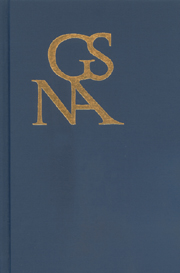Book contents
- Frontmatter
- Contents
- Special Section on Goethe and Idealism
- Introduction—Goethe and Idealism: Points of Intersection
- Goethe and Spinoza: A Reconsideration
- Goethean Intuitions
- Goethe's Notion of an Intuitive Power of Judgment
- “Idealism is nothing but genuine empiricism”: Novalis, Goethe, and the Ideal of Romantic Science
- The Quest for the Seeds of Eternal Growth: Goethe and Humboldt's Presentation of Nature
- Hegel's Faust
- Goethe contra Hegel: The Question of the End of Art
- Goethean Morphology, Hegelian Science: Affinities and Transformations
- Die Gretchenfrage: Goethe and Philosophies of Religion around 1800
- Civic Attachments & Sibling Attractions: The Shadows of Fraternity
- Margarete-Ariadne: Faust's Labyrinth
- Save the Prinz: Schiller's Geisterseher and the Lure of Entertainment
- Walsers Trilogie der Leidenschaft: Eine Analyse seines Goethe-Romans Ein liebender Mann im Kontext der Tradition der Ulrike-Romane
- Review Essay: What's New in the New Economic Criticism
- Book Reviews
Save the Prinz: Schiller's Geisterseher and the Lure of Entertainment
from Special Section on Goethe and Idealism
Published online by Cambridge University Press: 05 February 2013
- Frontmatter
- Contents
- Special Section on Goethe and Idealism
- Introduction—Goethe and Idealism: Points of Intersection
- Goethe and Spinoza: A Reconsideration
- Goethean Intuitions
- Goethe's Notion of an Intuitive Power of Judgment
- “Idealism is nothing but genuine empiricism”: Novalis, Goethe, and the Ideal of Romantic Science
- The Quest for the Seeds of Eternal Growth: Goethe and Humboldt's Presentation of Nature
- Hegel's Faust
- Goethe contra Hegel: The Question of the End of Art
- Goethean Morphology, Hegelian Science: Affinities and Transformations
- Die Gretchenfrage: Goethe and Philosophies of Religion around 1800
- Civic Attachments & Sibling Attractions: The Shadows of Fraternity
- Margarete-Ariadne: Faust's Labyrinth
- Save the Prinz: Schiller's Geisterseher and the Lure of Entertainment
- Walsers Trilogie der Leidenschaft: Eine Analyse seines Goethe-Romans Ein liebender Mann im Kontext der Tradition der Ulrike-Romane
- Review Essay: What's New in the New Economic Criticism
- Book Reviews
Summary
THERE IS A PASSAGE in Schiller's poetological writings that merits attention because it captures the essential paradox of Schillerian freedom and didactic intention. This is Schiller's contention in “Über Matthissons Gedichte” (1794) that “die höchste Freiheit gerade nur durch die höchste Bestimmtheit möglich ist.” Within a discussion of landscape description in poetry, Schiller expands on the role of the poet, which is that of determining the reader's sensations for the sake of receptivity to higher ideals. Clearly aware that his remarks on determination evoke coercion, Schiller tries to demonstrate that the paradox of determining thoughts and emotions while preserving the determinee's freedom is merely apparent. He argues that the poet, who must be certain of his effects, but also respect the reader's freedom, will prescribe for the reader exactly that path that the reader's imagination would have taken in full freedom, a formulation that is as logically fraught as the pairing of freedom and determination. He then offers practical advice as to how to accomplish the task of prescribing that which would also be freely chosen. The key lies in apprehending the rules according to which the imagination functions:
Die Imagination in ihrer Freiheit folgt, wie bekannt ist, bloss dem Gesetz der Ideenverbindung, die sich ursprünglich nur auf einen zufälligen Zusammenhang der Wahrnehmungen in der Zeit, mithin auf etwas ganz Empirisches, gründet. Nichts desto weniger muss der Dichter diesen empirischen Effekt der Association zu berechnen wissen, weil er nur insofern Dichter ist, als er durch eine freie Selbsthandlung unsrer Einbildungskraft seinen Zweck erreicht. […]
- Type
- Chapter
- Information
- Goethe Yearbook 18 , pp. 245 - 258Publisher: Boydell & BrewerPrint publication year: 2011

